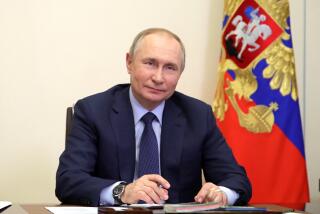Serbia’s Milosevic--Nationalism With Rigid Rule
- Share via
BELGRADE, Yugoslavia — As this country balances precariously between war and peace, the man likely to tip the scales is an uncompromising Communist who has built his career on a strategy of rigid authoritarian rule wrapped in born-again nationalist rhetoric.
Slobodan Milosevic’s stature rose to almost mythical dimensions among Serbs who worshipped him for reinvigorating pride in Serbia by brutally subjugating other ethnic groups, particularly the Albanians of Kosovo province.
But the spell was shattered when Milosevic unleashed his hardened police force on his own people during recent anti-Communist unrest, setting in motion a fall in popularity and proving the time-honored maxim that he who lives by the sword also perishes by it.
Milosevic’s apparent resolve to risk everything to maintain his tight grip on power threatens to engulf Yugoslavia in a bloody conflagration between Serbs and Croats.
“Milosevic is not a real politician at all because he does not understand the art of compromise,” says Stojan Cerovic, a Serbian journalist who has written extensively on Milosevic for the liberal weekly Vreme. “When he sets his sights on something, he just charges ahead, regardless of the cost, even if it is measured in human lives. To the end, he is a gambler.”
Milosevic endures little public scrutiny because he deliberately avoids the very people he claims to represent. Indeed, in his three years as Serbia’s paramount leader, Milosevic has never traveled outside Yugoslavia and has only left the republic twice.
When he does venture out into the heartland of his political base for carefully orchestrated appearances, he moves about in an impenetrable cocoon of security.
He almost never gives press interviews, except through statements to loyal state-run media. The only foreign leader to visit Milosevic was Romanian President Ion Iliescu, an equally defensive and populist figure.
A senior Western diplomat attributes Milosevic’s reclusive nature to an almost paranoid fear that opening himself to the masses risks a loss of control.
Milosevic’s well-oiled propaganda machine paints a world rife with anti-Serbian conspiracies, alleging that forces that include the Vatican, the CIA, Western banks and others are plotting to destroy his socialist republic.
During his ascension as Communist leader in Serbia, Milosevic reportedly sold out former friends and colleagues in the party echelons, many of whom he was later to denounce as feeble-minded and corrupt bureaucrats.
His main line of assault was to blame the party’s old guard for the plight of the Serbian minority living in the predominantly Albanian province of Kosovo.
By successfully forcing the issue of Kosovo--for many the cradle of Serbian culture--on a previously uninspired party structure, Milosevic quickly realized that the nationalist card would be his ticket to success.
With calculated precision and under the guise of solidarity with Kosovo’s Serbs, Milosevic and his new team of Communist opportunists in 1988 launched a series of massive street rallies that spread around Serbia.
By reasserting Serbian rule over the historically significant Kosovo region, scene of a 1389 battle that was a vain but glorious attempt to halt the Turkish advance into Europe, Milosevic won the worship of Serbs who feared that the territory was destined to be lost to Albania.
Milosevic, 49, was born in the industrial town of Pozarevac. After studying law in Belgrade, he rose through the ranks of Communist Party functionaries in postwar Yugoslavia’s fossilized industries.
From 1978 to 1982, he served on the board of directors of state-run Beobanka, which took him to New York. Oddly, he picked up a southern American drawl with his heavily accented English, which he has rarely employed since returning to Yugoslavia.
An economist who worked with him abroad said Milosevic showed a poor grasp of economics but excelled in organizational matters.
That experience likely forged connections in Yugoslav banking circles that allowed the authoritarian leader to procure funds to dish out as raises and bonuses to workers, greasing the path to a sweeping victory in multi-party elections in December.
The Serbian leadership also managed to tap federal coffers to the tune of $1.4 billion after the election to pay republic debts.
One of the primary influences on Milosevic’s outlook is his wife, Mirjana Markovic, a professor of Marxism at the University of Belgrade. Her ideological cronies at the Communist Party committee at the university are some of Milosevic’s closest advisers.
Some familiar with his meteoric rise to power see Milosevic as more of a political chameleon than an ideologue.
“He knows to pull back, to make some concessions,” Communist-turned-dissident Milovan Djilas said of Milosevic after students and opposition supporters confronted him with his greatest challenge to continued rule last week. “He’s a fighter.”
More to Read
Sign up for Essential California
The most important California stories and recommendations in your inbox every morning.
You may occasionally receive promotional content from the Los Angeles Times.










